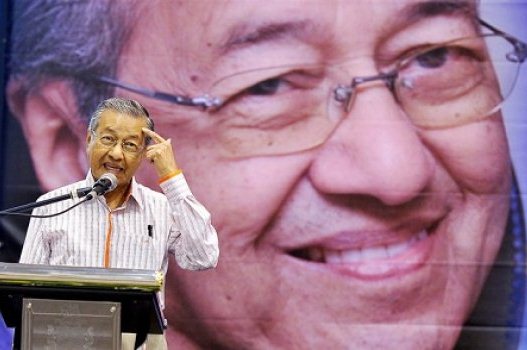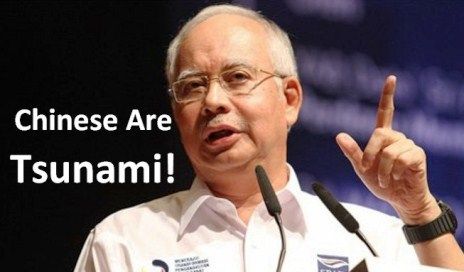The seeds of today’s political crisis in Malaysia were sown decades ago in an elaborate structure that has maintained a small elite in power since it was known as Malaya and achieved its independence from Britain in 1957.
Direct discussion of the subject has basically been criminalized since the 1970s and deemed too sensitive for debate. Thus there has been little public discourse on who really exercises power, how and for whom. That has helped to enshrine a structure that has used a form of Malaysian apartheid to support this elite in positions of privilege over the rest of Malaysians they rule.
Ever since the British colonial era, Malaysia has been divided and regarded through a racial prism. The major races that represented the Malay Peninsula steered Malaya to independence in 1957and into the Federation of Malaysia in 1963. However with rekindled Malay nationalism developing in the 1960s, an opportunity arose after disastrous 13 May 1969 race riots that took the lives of several hundred people on both sides of the racial divide.
Although the country’s founding father Tunku Abdul Rahman had already invoked a state of emergency in 1969, closing down the parliament and ruling by decree through the National Operations Council, Abdul Razak became prime minister in what by any other name would have been described as a coup. As premier, he was able with the backing of the Malay aristocracy to push through the New Economic policy (NEP) without hindrance.
Mahathir the Architect

Dr M
The NEP was based upon many ideas within Mahathir Mohamad’s 1970 book The Malay Dilemma, that argued that a program of affirmative action was necessary to break Chinese economic superiority. At the time, the NEP was seen even internationally as necessary. It stipulated the use of quotas in granting educational places at schools and universities, the use of quotas in public service, favoritism to Malays in the granting of business licenses, the development of Malay reserve land, restricting non-Bumiputera purchases, subsidies on the purchase of real estate, quotas on public equity holdings, general subsidies for Bumiputera businesses, and exclusive Bumiputera mutual funds (ASN, ASB), which gave better rates of return than commercial banks.
When the Parliament reconvened in 1971, both the Sedition and Internal Security Acts were strengthened to limit any discussion about matters concerning Malay special rights, the Malay rulers or citizenship under the guise of preserving intercommunal harmony. These restrictions also applied to members of parliament, weakening the principle of parliamentary immunity and attracting international condemnation.
The Malay Agenda

PM Najib
It was during this period that a concerted effort was made to create a leadership to maintain and support what they called the “Malay Agenda,” according to an interview with an anonymous official within the Abdul Razak government at the time. Most executive positions, civil service placements, and high ranking police and army personnel were to be filled with people sympathetic to the Malay Agenda.
The source also told Asia Sentinel that it was during the Razak era that selected bureaucrats and other people began to create and acquire corporate assets with the objective of channelling funds back to UMNO to fight future elections, to ensure victory.
The Malay agenda meant running government and agencies within government with the objective of looking after Malay interests ahead of others. The agenda was rarely spoken about in the open but had wide appeal among all levels of Malay society, including some members of the royal families.
The Start of Crony Capitalism

Rosmah Mansor, the PM's wife and allegedly the 'power behind the throne' is famous for her shopping sprees
That was the beginning of crony capitalism in Malaysia. This loose ruling political-cabal developed in the Malay-feudalistic tradition in the sense that it required unquestioning loyalty to the leader of UMNO, who has always been the prime minister. A small proportion of this group became very rich through the implementation of this special agenda and are now Malay “old money.
Section 153 of the Malaysian constitution became the proclaimed legal basis of Malaysian apartheid measures. The Reid Commission, an independent commission responsible for drafting the Constitution of the Federation of Malaya prior to independence, had only intended Sec. 153 to be a temporary measure, to be reviewed by the parliament within 15 years.
The section states that “…it is the responsibility of the Yang Di-Pertuan Agong [the ruling
Sultan] to safeguard the special position of the Malays and natives of any of the States of Sabah and Sarawak,” thus turning Malay into a political construct, as there is no single Malay tribal grouping. The authorities over the years have attempted to “Malayanize” the indigenous peoples of the Malay Peninsula, the orang asli, through encouraging their conversion to Islam and adoption of Malay customs.
Najib’s Turn

Fast forward to the arrival of Abdul Razak’s son Najib, who came to power promising transformation of government and a new paradigm in race relations with the well-promoted 1Malaysia slogan. However, although being at the vanguard of moderation internationally, his actions domestically showed none of the moderation he had promised. Najib was totally silent when so-called Ketuanan Melayu – Malays first — organizations like Perkasa made outlandish statements about race.
His modus operandi has been silence when government organs and NGOs undertake extreme actions in defending Malays and Islam despite his calls for moderation at his annual trip to the United Nations General Assembly. This was particularly the case after UMNO’s poor election performance in 2013, where he personally blamed the Chinese on election night.
Both the 2008 and 2013 elections have seen the collapse of the Barisan’s other ethnic parties and a definitive turn to repression by UMNO, whose wholly owned newspaper Utusan Malaysia has been continually allowed to publish poisonous headlines and statements, such as apa lagi Cina mau, (what do the Chinese want next?) which were deemed inflammatory in the post-election environment.
UMNO Takes Charge

All political parties became subservient within an UMNO-dominated Barisan. This is ironically a result of opposition electoral success in 2013. Extreme groups have been allowed to make anti-Chinese rhetoric and racial insults with impunity, keeping minority groups quiet through fear and tension.
In terms of the popular vote, the Barisan is now in reality a minority. However through gerrymandering and the first past the post voting system, it is almost ensured to continue winning elections despite the current atmosphere of scandal.
UMNO has used the decline of electoral support for the component parties as an opportunity to consolidate power in its own right. The 2008 election allowed UMNO and the cabal that controls it to maneuver even more on the Malay Agenda.
Especially since 2013, economic and social policies have been allowed to degenerate into blatant racial discrimination, and something even more sinister. The civil service is being cleaned out. In Sabah, civil servants from Kadazan, Dusun and other ethnic groups are slowly being weeded out and replaced with Malays. The universities are being cleansed of dissidents.
The effects of this imposed policy of “Malaysian apartheid” upon the country today are profound, and can be summarized as follows:
The Feudal Ascendancy of the Malays

A feudal social structure has been developed within four sections of the populace;
The Malay elite who rule the country and their associates,
A Malay middle class which is predominantly urban,
A Malay rural class, and
The rest of the Malaysian population.
Politically, this rural Malay class has kept the Malay elite in power, while the educated middle class is turning away from UMNO.
A brain drain is occurring which includes not only just Chinese and Indians but Malays as well. The elite aren’t really concerned with this brain drain, as they see this as weakening any potential opposition. This loss of creative and innovative people is leaving a rent-seeking mentality within the country, at a time when creativity and innovation are needed. The leaders have intentionally nurtured the development of an unquestioning population, which is reflected in the Malaysian education system, as the best means to maintain a docile electorate that will not look at political issues like corruption very seriously.
There has been a general failure to eradicate poverty throughout rural Malaysia, as limited resources have been used to prop up the UMNO feudal warlords through white elephant rural development projects. Many such warlords have made it big through contracts while the areas they represent remain with inadequate basic infrastructure and rural assistance such as farm extension services and without even proper roads and irrigation. Poverty is still a major problem despite government claims of undue successes.
The Malaysian economy is skewed with inefficiencies and market restrictions that hinder its transformation into a mature developed sustainable economic system. Companies are still allowed monopolies and cartels, restricted import permits have created inefficient markets, and a general lack of transparency is making the Malaysian market unattractive to investors. The restriction of tenders to Bumi companies has created an inefficient Ali Baba business model in which the true management is by Chinese – Babas in Straits history, with a front man a well-dressed and often unneeded Malay, or Ali, which raises the cost of both government and business.
GLCs and other government-owned companies openly compete with entrepreneurs in the market with unfair advantage, thus stifling innovation and the willingness of private individuals to take business risks. Malaysia still needs economic growth to absorb new entrants to the workforce in the coming decade.
Meritocracy doesn’t exist within the Malaysian civil service, universities, or other agencies. Workers are forced to adopt a feudal stance, seeking favor from superiors to get promotions and survive within these organizations. Under such an environment there is no chance for creativity, critical thinking, or even honesty. Ketuanan Melayu is now turning hegemonic in a dangerous way that can spill off Malaysian shores. This stands Malaysian in a poor position to be internationally competitive.
The divide and conquer political strategy, use of bullying through third party NGOs and straight threats and arrogance have had a major effect on Malaysians. Many have lost hope and respect for the leadership of their country. Many are now resentful. There is potential for outbreaks of violence due to the uncontrollability of some extreme groups allowed to roam free, including the so-called Red Shirts who have been terrorizing the Chinese community. The country thinks in terms of race. This is not healthy and will not stand Malaysia well within the international community.
Malay Self-Confidence a Victim

Finally, it could be argued that Malay self-confidence has been destroyed and replaced with a national inferiority complex that the elite can play to at their whim. Ketuanan Melayu, according to UKM Professor Noraini Othman has connotations of enslavement, with a Malay master and servant relationship implied.
The cabal that was set up in the 1970s by Abdul Razak has been transferred across from leader to leader since that time. Each prime minister inherited a complete network of loyalists to the Agenda Melayu. This has been their strength. However cracks appeared in this political-cabal when Mahathir tried to make an argument with both his successors.
In addition, the scandals of the present prime minister are beginning to test those loyal to the Agenda Melayu to the point where some may break away from the cabal and spill the beans. Hence the sackings, demotions, transfers and arrests of late.
This however will not mean self-destruction to Malaysia’s political-cabal. It’s a fight over control and not reform. Winner will take all.
UMNO Transformed into Rent-Seekers

The very nature of UMNO itself, once a party of school teachers, junior civil servants, farmers, and fishermen, now transformed into a party of contractors, small entrepreneurs, and professional rent seekers, will serve Najib well as he tries to consolidate his position.
He can reward his warlords, maintain their loyalty, and even put more of his loyalists in place for the coming election, win it, and even end up having more power than he has now. This is Mahathir’s worst nightmare, and why he is working so hard to remove Najib before the next election.
To date very few international bodies have heavily criticized “Malaysian Apartheid.” The government will continue to get away with repressing its populace with divide and conquer tactics. There is no front against Malaysia, like there was against South Africa. Tribalism can be expected to continue during the 21st Century and anybody who tries to oppose it will meet bullying tactics to subdue them. The Malay position will remain a taboo subject for years to come.
This also means that the question as to whether the NEP/NDP has been protecting or marginalizing the Malays will not be discussed. This is an important question for the future of Malaysia and the challenges that lie ahead. As former Prime Minister Ahmad Badawi once said, “Malays who can’t learn how to walk without crutches will end up in a wheelchair”.
The system of discrimination has only benefitted in preserving a feudal hierarchy within Malaysian society where the new lords are political dynasties which are now fighting each other openly using 1MDB as the platform. This is not about corruption, but which family and surrounding group rules, rather than promise of social reform.
What the policies of the government and resulting social structure of society have created is a small elite class of rulers who believe they are the law. This elite is now in an unquestionable position of power, unable to be dislodged by the rule of law. They are unashamed by scandal and control all the elements of power through their network of loyalists through the civil service, police, armed forces, and judiciary. - http://www.asiasentinel.com/




No comments:
Post a Comment
Note: Only a member of this blog may post a comment.